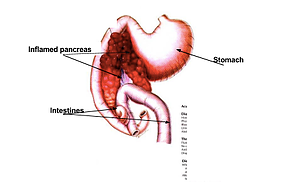Pancreatitis is a condition caused by inflammation of the pancreas, an organ of the digestive tract. The pancreas is located in the abdomen, lying close to the stomach and first part of the intestines. Functions of the pancreas include controlling blood sugar by producing a hormone called insulin and producing enzymes responsible for the digestion of fats and proteins.
Although the healthy pancreas produces useful enzymes, these same enzymes can cause the pancreas to destroy its own tissue. This process called “auto-digestion” is the first step in the development of pancreatitis. In mild cases with supportive care, changes in diet, and short courses of medications, the pet will recover. In severe cases, the tissues of the pancreas become damaged or cells of the pancreas begin to die off (necrosis), causing enzymes from the pancreas to leak into the abdomen resulting in pain and inflammation. Bacteria can then invade this area causing fluids to accumulate in the pancreas and abdomen leading to shock and possible death.
The causes of pancreatitis can be numerous, however in 90% of the cases the exact cause is unknown, or idiopathic. Sometimes it is due to overeating or eating high fat foods. Other predisposing causes include trauma to the pancreas, cancer, or inflammatory bowel disease.
Symptoms of pancreatitis include vomiting, lack of appetite, diarrhea, lethargy, restlessness and discomfort in the abdomen.
Diagnosis is by clinical signs and blood testing. Ultrasound is a helpful diagnostic tool to image the pancreas and surrounding areas to look for signs of other problems like tumors, fluid leakage or inflammation of the intestines. Early diagnosis and treatment of pancreatitis will give your pet the best chance of recovery.
Treatment of pancreatitis depends on the severity. Mild cases of pancreatitis can be treated with oral medications and bland diet. More severe cases can require hospitalization, intravenous fluids and medications. In some situations, cats experiencing pancreatitis may need surgical placement of a feeding tube to help give them the nutrition they need to heal.
Some pets will experience recurrent bouts of pancreatitis. These pets will often be prescribed special diets. Severe bouts of pancreatitis or recurrent flare ups of pancreatitis can lead to diabetes, liver damage or damage to the enzyme producing cells of the pancreas leading to maldigestion of foods. In these situations daily medications may be needed for life.
Key Points
- Pancreatitis is the inflammation of part of the gastrointestinal tract
- Symptoms can range from mild to severe
- Treatment can vary from diet change and oral medications to hospitalization with IV therapy
- Close monitoring and communication with your veterinarian is important

